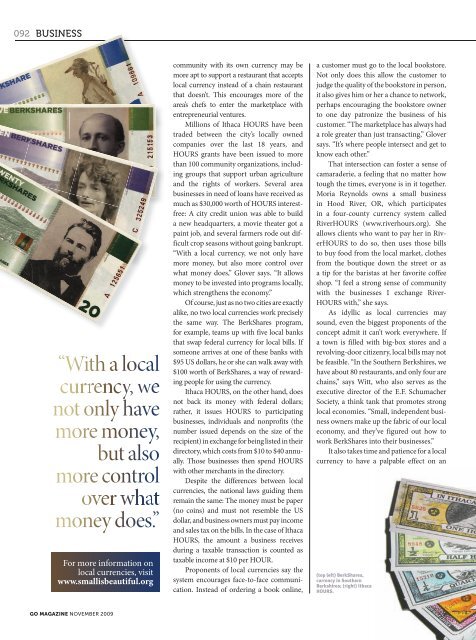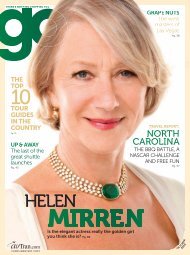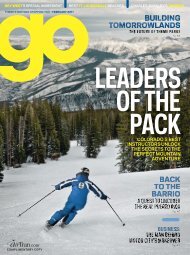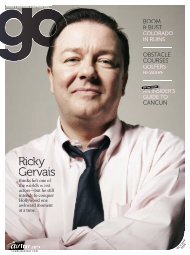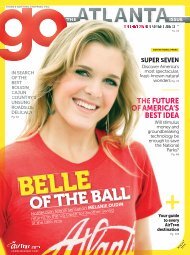You also want an ePaper? Increase the reach of your titles
YUMPU automatically turns print PDFs into web optimized ePapers that Google loves.
092 BUSINESS<br />
For more information on<br />
local currencies, visit<br />
www.smallisbeautiful.org<br />
GO MAGAZINE NOVEMBER <strong>2009</strong><br />
community with its own currency may be<br />
more apt to support a restaurant that accepts<br />
local currency instead of a chain restaurant<br />
that doesn’t. This encourages more of the<br />
area’s chefs to enter the marketplace with<br />
entrepreneurial ventures.<br />
Millions of Ithaca HOURS have been<br />
traded between the city’s locally owned<br />
companies over the last 18 years, and<br />
HOURS grants have been issued to more<br />
than 100 community organizations, including<br />
groups that support urban agriculture<br />
and the rights of workers. Several area<br />
businesses in need of loans have received as<br />
much as $30,000 worth of HOURS interestfree:<br />
A city credit union was able to build<br />
a new headquarters, a movie theater got a<br />
paint job, and several farmers rode out difficult<br />
crop seasons without going bankrupt.<br />
“With a local currency, we not only have<br />
more money, but also more control over<br />
what money does,” Glover says. “It allows<br />
money to be invested into programs locally,<br />
which strengthens the economy.”<br />
Of course, just as no two cities are exactly<br />
alike, no two local currencies work precisely<br />
the same way. The BerkShares program,<br />
for example, teams up with five local banks<br />
that swap federal currency for local bills. If<br />
someone arrives at one of these banks with<br />
$95 US dollars, he or she can walk away with<br />
$100 worth of BerkShares, a way of rewarding<br />
people for using the currency.<br />
Ithaca HOURS, on the other hand, does<br />
not back its money with federal dollars;<br />
rather, it issues HOURS to participating<br />
businesses, individuals and nonprofits (the<br />
number issued depends on the size of the<br />
recipient) in exchange for being listed in their<br />
directory, which costs from $10 to $40 annually.<br />
Those businesses then spend HOURS<br />
with other merchants in the directory.<br />
Despite the differences between local<br />
currencies, the national laws guiding them<br />
remain the same: The money must be paper<br />
(no coins) and must not resemble the US<br />
dollar, and business owners must pay income<br />
and sales tax on the bills. In the case of Ithaca<br />
HOURS, the amount a business receives<br />
during a taxable transaction is counted as<br />
taxable income at $10 per HOUR.<br />
Proponents of local currencies say the<br />
system encourages face-to-face communication.<br />
Instead of ordering a book online,<br />
a customer must go to the local bookstore.<br />
Not only does this allow the customer to<br />
judge the quality of the bookstore in person,<br />
it also gives him or her a chance to network,<br />
perhaps encouraging the bookstore owner<br />
to one day patronize the business of his<br />
customer. “The marketplace has always had<br />
a role greater than just transacting,” Glover<br />
says. “It’s where people intersect and get to<br />
know each other.”<br />
That intersection can foster a sense of<br />
camaraderie, a feeling that no matter how<br />
tough the times, everyone is in it together.<br />
Moria Reynolds owns a small business<br />
in Hood River, OR, which participates<br />
in a four-county currency system called<br />
RiverHOURS (www.riverhours.org). She<br />
allows clients who want to pay her in RiverHOURS<br />
to do so, then uses those bills<br />
to buy food from the local market, clothes<br />
from the boutique down the street or as<br />
a tip for the baristas at her favorite coffee<br />
shop. “I feel a strong sense of community<br />
with the businesses I exchange River-<br />
HOURS with,” she says.<br />
As idyllic as local currencies may<br />
sound, even the biggest proponents of the<br />
concept admit it can’t work everywhere. If<br />
a town is filled with big-box stores and a<br />
revolving-door citizenry, local bills may not<br />
be feasible. “In the Southern Berkshires, we<br />
have about 80 restaurants, and only four are<br />
chains,” says Witt, who also serves as the<br />
executive director of the E.F. Schumacher<br />
Society, a think tank that promotes strong<br />
local economies. “Small, independent business<br />
owners make up the fabric of our local<br />
economy, and they’ve figured out how to<br />
work BerkShares into their businesses.”<br />
It also takes time and patience for a local<br />
currency to have a palpable effect on an<br />
(top left) BerkShares,<br />
currency in Southern<br />
Berkshires; (right) Ithaca<br />
HOURS.


